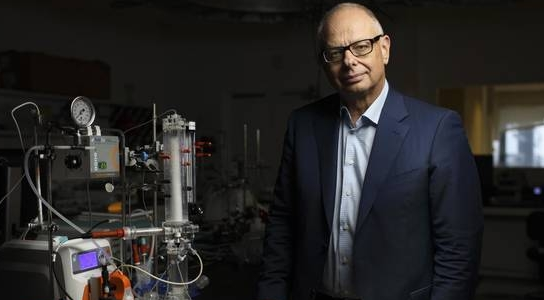(单词翻译:单击)
Carlo Montemagno is seen with a foam bioreactor for carbon capture in Edmonton on Friday, Jan. 6, 2017.
2017年1月6日星期五,在埃德蒙顿,Carlo Montemagno和碳捕获的泡沫生物反应器在一起。
Dr. Montemagno has engineered a new way to capture CO2 from industrial-gas emissions.
Montemagno博士已经设计了一个新方法从工业排放的气体中进行碳捕获。
What if carbon-dioxide emissions could be transformed from a liability into an asset?
当二氧化碳排放量从负债转化为资产会怎么样呢?
That’s the $20-million question behind the NRG COSIA Carbon XPrize, a global competition to create technology that converts CO2 into valuable products.
这就是加拿大油砂创新联盟(COSIA)和NRG能源所设立的2000万美元的碳清洁技术奖(XPrize)所提出的问题,这是一项全球性的关于将二氧化碳转化为有价值的产物的科技竞赛。
“In energy and climate, few ideas are as potentially transformative as the idea of turning the economics of CO2 and climate change on its head,” said Marcius Extavour, director of technical operations for the prize.
本次奖项的技术实施负责人Marcius Extavour表示:“在能源和气候领域,没有什么点子能在变革型的潜力上和转化二氧化碳和改造气候相提并论。”
Nine Canadian companies are among the 27 teams that have advanced to the semifinals.
有9家加拿大公司所属的27支队伍入围了半决赛。
Ten finalists will be announced in 2018 and a winner will be revealed in 2020.
2018年将决出进入最后决赛的十强队伍,冠军则将于2020年公布。
Here’s a look at some of the Canadian semifinalists.
以下是一些入围的加拿大队伍:
Ingenuity Lab, Edmonton
来自埃德蒙顿的"心灵手巧实验室"
Ingenuity Lab director Carlo Montemagno has engineered a new way to capture CO2 from industrial-gas emissions. His technology harnesses photosynthesis, the process plants use to convert carbon dioxide into chemical energy using light.
该实验室负责人Carlo Montemagno已经设计了一个新方法从工业排放的气体中进行碳捕获。他的技术是利用光合作用,通过使用光照射植物将二氧化碳转化为化学能。

The technology mimics the biochemical reactions of photosynthesis in non-living materials to generate the energy to transform the carbon dioxide into valuable products. It takes the CO2 from flue gas and builds the carbons up into long chains, with the result being that 47 different specialty chemicals can be produced.
这项科技模拟了光合作用的在非生活物质环境中的生化反应,以产生能量将二氧化碳转化为有价值的产物。
Dr. Montemagno added that plants require a significant amount of energy to grow, so they’re not very efficient at sequestering carbon to produce value-added chemicals. But in his technology, no energy has to be spent to keep an organism alive, so all the output can go toward the products that one wants to create.
Montemagno博士补充道,由于植物需要大量能量才能生长,这样它们在进行碳封存以制造具备附加值的化学品时效率就不是很高。但是在他的技术里,无需任何能量就可以保证有机体存活,这样所有的能量产出就将用于制造目标产物。
“This efficiency is game-changing, opening up new opportunities for the sustainable production of products we all need from waste,” he said in an e-mail.
他在一份Email中表示:“这个效率是颠覆性的,为我们生产从废物里回收的所有我们所需的可持续产品打开了新的机会之门。”
Terra CO2 Technologies, Vancouver
来自温哥华的“地球二氧化碳科技公司”
Terra CO2 Technologies is developing a technique to transform acid rock drainage and carbon-dioxide emissions – two damaging byproducts of mining – into a stable substance.
该公司正在开发一项科技以转化矿山酸性排放以及二氧化碳排放量——两个由于采矿所带来的具有破坏性的副产物——成为一种稳定物质。
Acid rock drainage refers to the acidic water that results when sulphide minerals are exposed to air and water and produce sulphuric acid, which is harmful to wildlife if it leaks into waterways. Mining companies must use costly methods to contain the drainage, including treating it with lime and storing it in large tailings ponds.
矿山酸性排放指的是含有硫化物的矿物暴露于空气、水中时,将产生硫酸,硫酸如果泄露到水体里将成为对野生动物造成危险的酸性水。矿业公司必须使用价格不菲的方法来控制排放,包括使用石灰来处理或者将其储存于大型尾矿池中。
Terra CEO Dylan Jones said the company aims to solve the environmental threat of acid rock drainage and save mining companies money. Their technology treats the drainage through an electrochemical process that separates the sulphur from the mineral.
公司负责人Dylan Jones表示,公司的目标是解决矿山酸性排放所导致的环境威胁,并节省矿业公司的开支。它们的技术将排放物通过一个电化学装置以将硫化物从矿石中分离出来。
The company uses a common iron-sulphide mineral called pyrite or “fool’s gold” as an example. It pulls CO2 out of the air and combines with the iron to make an iron carbonate, which is stable in normal atmospheric conditions and doesn’t produce any acid.
公司使用一种常见的硫铁矿物,即黄铁矿,亦称“愚人金”作为示范。它将空气中的二氧化碳抽出,并和铁结合生成铁的碳酸盐,这个产物在自然空气中可以稳定存在,而且不再产生任何酸类物质。
“Our application for the technology is huge for the mining industry,” Mr. Jones said. “We’re looking at it as a cost-saving technology.”
Jones先生表示:”我们的应用科技对于矿业公司而言意义重大,我们将其视为一项节省开支的技术。“
Carbicrete, Montreal
来自蒙特利尔的”碳凝土“
Cement produces a great deal of greenhouse gas emissions – about one tonne of CO2 for every tonne of cement.
水泥生产产生大量的温室气体排放——差不多每生产一吨水泥就会排放一吨的二氧化碳。
That’s why Carbicrete invented a way to make concrete without using cement.
这就是为什么这家公司发明了一个新方法,即不使用水泥的情况下来制作混凝土。
Instead of using cement to bind together the concrete, the company uses steel slag, a byproduct of the steel-making process that mostly ends up in landfills. In doing so, it avoids the CO2 emissions associated with cement.
这家公司使用钢渣来取代混凝土中的水泥,钢渣是炼钢过程中产生的副产物,大部分时候都被当垃圾填埋了。这么做的结果就是避免了因生产水泥而产生的二氧化碳排放。
Mehrdad Mahoutian, who originally invented the technology at McGill University, added that precast concrete products are normally cured with heat and steam, but Carbicrete cures its concrete with CO2 gas, which permanently sequesters the CO2 and keeps it out of the atmosphere.
在McGill大学发明这项技术的Mahrdad Mahoutian补充道,预制的混凝土产品一般来说都是通过热源和蒸汽来加工,但是公司使用的是二氧化碳来构造混凝土,其永久性的将大气中的二氧化碳封存起来。
In effect, the product is carbon-negative concrete.
结果就是,这个产物就是无碳的混凝土。
“We’re taking garbage, and we’re turning it into a valuable product and solving climate change all in one step,” CEO Chris Stern said.
负责人Chris Stern表示:”我们拿走了垃圾,一步就将他们转化成了具有价值的产物,而且同时还解决了气候变化问题。“
CarbonCure Technologies, Dartmouth, N.S.
来自新斯科舍省达特茅斯市的”碳加工科技公司“
Nova Scotia-based CarbonCure Technologies has also developed a way to use CO2 to make better concrete.
坐落于新斯科舍省的该公司也是通过开发了一个新方法来将二氧化碳变成更好的混凝土。
The company takes CO2 from any industrial source – a power plant or a refinery, for example – and injects it into concrete, where it is sequestered and turned into a solid. The process reduces the carbon footprint of the product by taking CO2 out of the air and turning it into a solid material, which happens to make concrete stronger, and also cuts down the concrete producer’s costs.
这家公司从任何工业来源,比如发电厂或者冶炼厂,获取的二氧化碳注入混凝土,然后二氧化碳就被封存起来变成了固态。这个过程通过将二氧化碳从空气中剥离并转化为一种固态物质以实现碳封装,这种固态物质还能让混凝土的强度变大,同时可以降低混凝土制造商的成本。
There is more concrete manufactured on the earth than any other material, so this technology has the potential to reduce significant quantities of CO2, vice-president of sustainability Jennifer Wagner said.
负责可持续发展的副主管Jennifer Wagner表示,在地球上,混凝土生产得比其他材料多得多,所以此项技术有潜力减少大量的二氧化碳。
“The technology makes concrete stronger, greener and less expensive to manufacture.”
”这项技术让混凝土的强度变大、更环保也让生产变得更便宜。“


